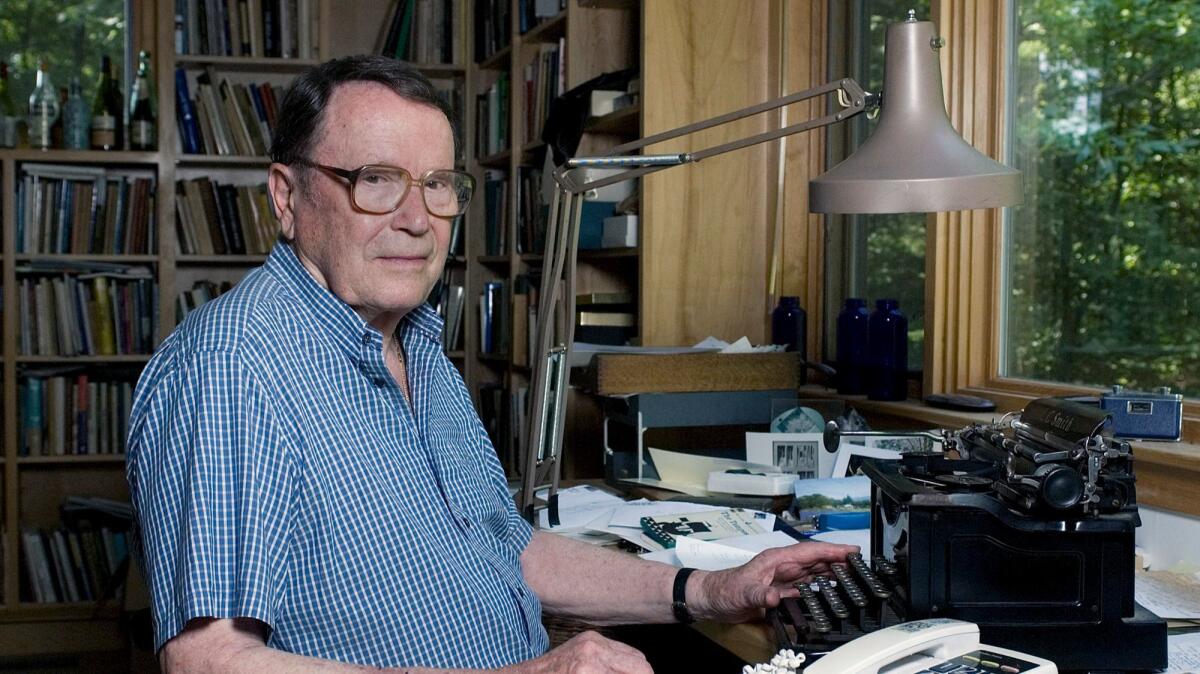Richard Wilbur, who twice won Pulitzer Prize for his poetry, dies at 96

- Share via
Richard Wilbur, the Pulitzer Prize-winning poet and translator who intrigued and delighted generations of readers and theater-goers through his rhyming editions of Moliere and his own verse on memory, writing and nature, has died.
Wilbur died Saturday night in Belmont, Mass., with his family by his side, according to friend and fellow poet, Dana Gioia. He was 96.
The U.S. poet laureate in 1987-88, Wilbur was often cited as an heir to Robert Frost and other New England writers and was the rare versifier to enjoy a following beyond the poetry community. He was regarded — not always favorably — as a leading “formalist,” a master of old-fashioned meter and language who resisted contemporary trends. Wilbur was also known for his translations, especially of Moliere, Racine and other French playwrights. His playful, rhyming couplets of Moliere’s “Tartuffe” and “The Misanthrope” were often called the definitive editions of those classic 17th century satires.
Wilbur’s expertise in French literature eventually brought him to Broadway as a lyricist for Leonard Bernstein’s production of Voltaire’s “Candide,” which premiered in 1956. Numerous other writers, including Dorothy Parker and James Agee, had been unable to get along with the demanding team of Bernstein and Lillian Hellman.
“Lillian had heard about my translation of Moliere’s ‘The Misanthrope’ and wanted to have a look at it,” Wilbur told the Associated Press in 2006. “She decided that if I could translate one witty Frenchman, I might be able to do another.”
He received numerous literary honors, including the National Book Award and two Pulitzer Prizes, for “Things of This World,” released in 1956, and for “New and Collected Poems,” which came out in 1989. Upon announcing in 1987 that Wilbur would serve as poet laureate, Librarian of Congress Daniel J. Boorstin called him “a poet for all of us, whose elegant words brim with wit and paradox.”
Handsome and athletic into his 90s, with a warm, clear voice ideal for readings, he had an unusual quality for a major poet: happiness. His Christian faith was unbroken by the influence of campus leftists at Amherst College, his wartime service on the front lines in Europe or his acquaintance with such self-destructive peers as Sylvia Plath, whom he remembered in his poem “Cottage Street 1953” as “the pale, slumped daughter” of her “frightened” mother.
“I think many people associate happiness with shallowness,” Wilbur said. “What people don’t want is someone who is complacent. And I know that I am not a complacent man.”
Plath was among his admirers, praising the “witty rhymes” and “sparkling style” of his translation of “The Misanthrope” and finding his poetic style “congenial” to hers.
Wilbur’s poems were often brief, subtle, temperate, reflecting upon childhood, family, nature and the creative process. In “Mind,” he likened the mind to “some bat/That beats about in caverns all alone/Contriving by a kind of senseless wit/Not to conclude against a wall of stone.” A connoisseur of riddles, he loved constructing poems in which the meaning is not revealed until the end, like a well-delivered punchline.
Wilbur married Charlee Ward, a Smith College student, while he was nearby at Amherst, in 1942. They had four children. Charlee Ward Wilbur died in 2007.
Richard Wilbur, an 11th-generation American and son of a commercial artist, was born in New York in 1921 and moved two years later to rural New Jersey, where his family lived in a Colonial-era stone house on 400 acres of land, much room for a young poet and his thoughts. As a teenager, his poem about a nightingale was published in John Martin’s Magazine. He was paid $1.
Kicked out of the Signal Corps at the start of World War II — he was classified as “Suspected of Disloyalty” because of his college friends — he was transferred to the front lines in the 36th Infantry. He recalled jotting down verse in moments of spare time because it was the most practical way of expressing himself. “In a foxhole, you can write a poem, but you cannot paint a picture,” he observed.
Studying at Harvard University after the war, Wilbur befriended French poet Andre du Bouchet. When Wilbur’s wife, Charlee, confided that her husband had a hidden stash of work, du Bouchet demanded to see it. He welcomed Wilbur as a fellow poet by kissing him on both cheeks and helping him get a publisher.
“It was the most painless, positive experience of getting a book published that I could imagine,” Wilbur recalled.
His first book, “The Beautiful Changes and Other Poems,” came out in 1947. He also wrote children’s books and translated many European poets, including Baudelaire, Anna Akhmatova and Joseph Brodsky. His lyrics for “A Stable-Lamp is Lighted” were adapted into a popular hymn.
In 2004, his “Collected Poems, 1943-2004” was published to great acclaim and helped solidify a reputation that had varied over the years, with Wilbur often dismissed during the 1960s and 1970s as tame and insulated.
“Like his face, his poems show no deterioration over time,” critic Phyllis Rose wrote in Poetry magazine in 2005. “The later poems are as elegant and intricate, as devoted to musical pleasures, as fully achieved, as the earliest.”
For much of his adult life, Wilbur wrote every day, in longhand, then transcribed his work on a manual typewriter. Just as poetry and translation called for very different talents, so they also made different demands on his daily life.
“When I’m translating a play ... I write obsessively all day,” he told the AP in 2006. “Even when I’m taking a nap, there are lines working in my mind.
“As for poems, one doesn’t set a poem aside until it’s done.”
More to Read
Start your day right
Sign up for Essential California for the L.A. Times biggest news, features and recommendations in your inbox six days a week.
You may occasionally receive promotional content from the Los Angeles Times.






